2012 Mount Salak Sukhoi Superjet crash
On 9 May 2012, a Sukhoi Superjet 100 airliner on a demonstration tour in Indonesia crashed into Mount Salak, in the province of West Java. All 37 passengers and 8 crew on board were killed. The plane had taken off minutes before from Jakarta's Halim Airport on a promotional flight for the recently launched jet, and was carrying Sukhoi personnel and representatives of various local airlines.[1]
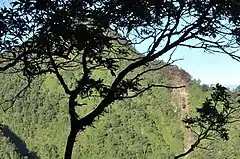 The eastern face of Mount Salak, showing the point (right) where the jet impacted the slope | |
| Accident | |
|---|---|
| Date | 9 May 2012 |
| Summary | Controlled flight into terrain |
| Site | Mount Salak, Indonesia 6°42′45″S 106°44′5″E |
| Aircraft | |
| Aircraft type | Sukhoi Superjet 100-95 |
| Operator | Sukhoi |
| IATA flight No. | RA36801 |
| Call sign | SUKHOI 36801 |
| Registration | RA-97004 |
| Flight origin | Halim Perdanakusuma Airport, Jakarta, Indonesia |
| Destination | Halim Perdanakusuma Airport, Jakarta, Indonesia |
| Occupants | 45 |
| Passengers | 37 |
| Crew | 8 |
| Fatalities | 45 |
| Survivors | 0 |
The subsequent investigation concluded that the flight crew was unaware of the presence of high ground in the area and ignored warnings from the terrain warning system, incorrectly attributing them to a system malfunction while their view was obstructed because of thick cloud cover.[2] It was also established that in the minutes leading to the accident, the crew, including the captain, were engaged in conversation with prospective customers present in the cockpit.[3] The crash is both the first hull loss and first fatal accident involving a Sukhoi Superjet 100.[4]
Background
Aircraft
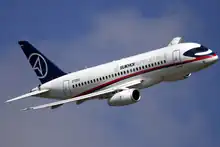
The aircraft involved in the accident was a Sukhoi Superjet 100, registration RA-97004,[5] msn 95004. The aircraft was manufactured in 2009 and had accumulated over 800 flight hours at the time of the accident.[6] The Superjet 100 is the first production airliner model produced in Russia since the dissolution of the USSR in 1991.[7]
Demonstration tour
The jet was flying as part of a "Welcome Asia!" demonstration tour. With a different jet, a demo flight had been flown successfully in Kazakhstan, but when the tour moved to Pakistan, potential buyers could see the aircraft only on the runway as no flight took place, reportedly due to a technical glitch. A leak in a 'nozzle in the engine' was found in this plane on the way to Myanmar, according to Alexander Tulyakov, vice-president of the United Aircraft Corporation, and it returned to Moscow. The jet involved in the accident was then flown in as a replacement to continue the tour.[8] It had been scheduled to visit Laos and Vietnam.[9] At the time of the crash, Sukhoi had 42 orders of the type from Indonesia, 170 in total, and was hoping to produce up to 1,000 aircraft.[10]
Mount Salak
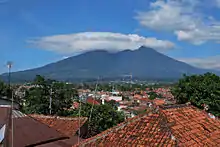
In the decade between 2002 and 2012, there were seven aviation crashes in the area of Mount Salak. Three people were killed in a crash of a training aircraft not long before the SSJ-100 accident; 18 people were killed in a crash of an Indonesian Air Force military aircraft in 2008; five people were killed in a crash in June 2004, two in April 2004, seven in October 2003, and one in October 2002.[11][12]
The Jakarta Post has dubbed Mount Salak "an airplane graveyard".[12] High turbulence and fast-changing weather conditions of the mountainous terrain are cited as contributing factors to multiple aviation crashes in the area.[12]
Crash
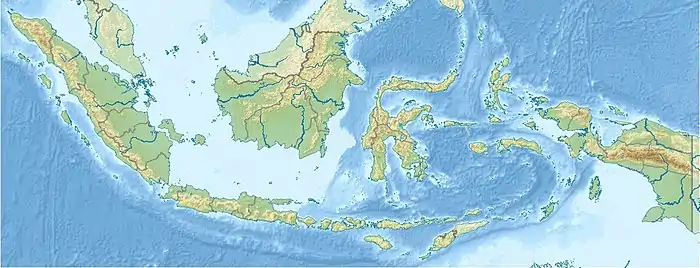
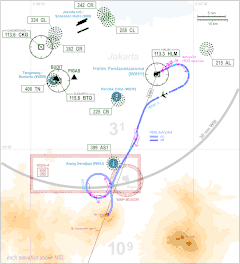
At 14:00 local time (07:00 UTC),[13] the SSJ-100 departed from Halim Perdanakusuma Airport for a local demonstration flight, and was due to return to the departure point.[6] This was the second demonstration flight the aircraft was operating that day.[14] There were six crew; two representatives from Sukhoi and 37 passengers on board.[6] Amongst the passengers were representatives from Aviastar Mandiri, Batavia Air, Pelita Air Service and Sriwijaya Air.[4] At 14:26 (07:26 UTC), the crew requested permission to descend from 10,000 feet (3,000 m) to 6,000 feet (1,800 m), and this was granted. Two minutes later, the crew requested and were approved to "orbit to the right."[15] This was the last contact that Air Traffic Control had with the aircraft,[6] which was then about 75 nautical miles (86 mi; 139 km) south of Jakarta,[4] in the vicinity of 7,254-foot-high (2,211 m) Mount Salak, a mountain higher than the requested flight level. Four minutes after beginning the orbit, the aircraft's Enhanced Ground Proximity Warning System sent out a single "Terrain Ahead, Pull Up" audio alert, warning the crew that their predicted flight path would require a climb to avoid terrain. Immediately after, the warning changed to an "Avoid Terrain" message, which is triggered when the aircraft would also need to be turned to avoid oncoming terrain. While the latter message sounded repeatedly, the pilots briefly discussed the warning and disabled it, believing it to be a problem with the system's terrain database. Less than 30 seconds later, the airplane's aural warning system sounded a "Gear Not Down" alert, which is independent of the EGPWS and signifies the aircraft being too close to the ground without its landing gear lowered. The captain then disengaged the autopilot and put the airplane into a slight nose-up attitude; this was not consistent with an evasive maneuver, and the reason for this input was not conclusively determined. The captain tells the first officer that the autopilot is off, and impact with terrain occurred two seconds later, at 14:33 local time (07:33 UTC).[15]
Simon Hradecky, of The Aviation Herald, later reported:
Indonesia's Air Traffic Control, Jakarta Branch, reported that communication between ATC and aircraft was done in English; there was no language problem hampering communication. The aircraft had been in the area of Bogor, approximate coordinates 6.55°S 106.9°E, about 13 nautical miles (15 mi; 24 km) northeast of the peak of Mount Salak and 7 nautical miles (8.1 mi; 13 km) clear of mountainous terrain in safe flat area, when the crew requested to descend and to perform a right orbit. As there was no reason to decline such a clearance the flight was cleared down and for the right orbit. This was the last transmission from the aircraft; the aircraft could not be reached afterwards. The plane having finished the right orbit flew a course about 210°. It is unclear how the aircraft got into the area of Mount Salak and crashed afterwards, ATC services hope the black boxes will explain how the aircraft got there. All data including flight plan, radar data and ATC recordings as well as transcripts of interviews with the air traffic controller have been handed to Indonesia's NTSC.[6]
A ground-and-air search for the aircraft was initiated, but was called off as night fell. On 10 May (the following day) at 09:00 (02:00 UTC), the wreckage of the Sukhoi Superjet was found on Mount Salak. It is only known that the aircraft had been flying on a clockwise flightpath around the mountain, towards Jakarta, before the crash.[6][16] Preliminary reports indicated that the aircraft had hit the edge of a cliff at an elevation of 6,270 feet (1,910 m), slid down a slope and came to rest at an elevation of 5,200 feet (1,600 m). The site of the accident was not accessible by air and no rescuers had reached the site by nightfall on 10 May. Multiple groups of rescue personnel attempted to reach the wreckage on foot.[6]
Victims
| Nationality | Passengers | Crew | Total |
|---|---|---|---|
| Indonesia | 35 | - | 35 |
| Russia | - | 8 | 8[17] |
| United States | 1 | - | 1[18] |
| France | 1 | - | 1[19] |
| Total | 37 | 8 | 45[17] |
Most of the passengers were journalists and prospective clients.[20] The 45 people on board included 14 people from the Indonesian airline Sky Aviation, Captain Aan Husdiana (Director of Operations for Kartika Airlines) and five reporters, Dody Aviantara (journalist) and Didik Nur Yusuf (photographer) from Angkasa aviation magazine, Ismiati Soenarto and Aditya Sukardi of Trans TV and Femi Adi of the American Bloomberg News.[17] An accomplished and experienced pilot, Peter Adler held a US passport, acting as a consultant and a passenger on the flight;[18] according to Vladimir Prisyazhnyuk, the head of Sukhoi Civil Aircraft, two Italians and one French citizen of Vietnamese descent were also on board.[19] The captain of the jet was Alexander Yablontsev (57), a former Russian combat pilot, test pilot, and cosmonaut.[21] He had been involved in the Buran space program, and was the pilot for the first flight of Superjet 100 in 2008.[22][23][24] The first officer was Alexander Kotchetkov (44) and the flight navigator was Oleg Shvetsov (51).[25]
Investigation
One day after the crash, Russian Prime Minister Dmitry Medvedev set up a commission, headed by Yury Slyusar of the Industry and Trade Ministry, to investigate the cause of the accident. According to the National Transportation Safety Committee (NTSC), the Indonesian agency for the investigation of civil aircraft accidents, analysis of the crash would take up to 12 months.[26] On 15 May 2012, it was reported in the local media that the Indonesian government had turned down Russia's request to send back the flight data recorder, stating that Indonesian investigators would determine the cause of the crash, while Russian experts would provide support only.[27] The cockpit voice recorder was found on 15 May 2012 at a distance of 200 m from the tail section.[8] The flight data recorder was found on 31 May 2012[28] also at a distance of 200 m from the tail section.[29]
The Indonesian NTSC had released their preliminary report, which listed factual findings but did not attempt to determine the cause of the accident.[30] According to sources within the investigating committee, the aircraft was in full working order and the incident was ascribed to human error.[31][32]
The final report was released 18 December 2012.[15] Crash investigators determined that the plane's terrain warning system had been functioning correctly and had warned the pilots about the impending collision with the mountain. The pilots, however, turned the system off, believing that it was malfunctioning, even though their view of the surrounding area was obstructed by thick cloud cover.[2] Furthermore, the pilots were distracted by conversation on the flight deck unrelated to flying the plane, which contributed to their failure to notice that the plane was in danger. The investigation also found that the pilots were unaware of the terrain in the area because they lacked the proper charts for the area. A contributing factor was the lack of a Minimum Safe Altitude Warning System at the airport and the air traffic controller being too overworked to notice the impending crash.[3][33]
Aftermath

Sky Aviation, an Indonesian air carrier, delayed the delivery of 12 Superjet 100s following the accident.[34] Arifin Seman, the commissioner of Kartika Airlines, another domestic Indonesian carrier, went on record to say that the delivery of 30 Superjet 100s, which his company had ordered, would likely be delayed following the crash.[35] Several days later, however, the same source published Sky Aviation's statement in which they declared that they were not going to cancel the contract. Moreover, Sky Aviation's general manager for promotion, Sutito Zainuddin, added that "the additional 100-seat planes would be needed to connect major cities in Indonesia, particularly Jakarta".[36] Mexico's Interjet Board chairman Miguel Alemаn Velasco said the crash had no influence on the company's desire to purchase additional Superjets.
Russian airline Aeroflot and Armenian Armavia were the only two operators of the SSJ-100 at the time of the crash, but had not suspended operations of the type.[37] Armavia said that it would continue negotiations over the purchase of another Superjet 100 for its fleet, but the airline ceased operations later in 2013.[38]
In popular culture
The documentary television series Mayday covered the accident in the 2018 episode "Deadly Display".
See also
References
- Salna, Karlis (10 May 2012). "No survivors in Indonesia plane crash". 9 News. Archived from the original on 19 July 2012. Retrieved 10 May 2012.
- Brotak, Ed (27 July 2015). "What You Don't See". Flight Safety Foundation. Retrieved 7 May 2018.
Six "AVOID TERRAIN" warnings followed. The pilots apparently looked out and saw only clouds. They were not aware of any mountainous terrain and so turned off the TAWS.
- Niles, Russ (18 December 2012). "Superjet Pilots Blamed For Indonesia Crash". AVweb. Retrieved 20 December 2012.
- Ranter, Harro. "97004 Accident description". aviation-safety.net. Aviation Safety Network. Retrieved 9 May 2012.
- Aircraft registry Sukhoi Superjet 100. RussianPlanes.net (Russian)
- Hradecky, Simon (9 May 2012). "Crash: Sukhoi SU95 over Indonesia on May 9th 2012, aircraft impacted mountain". The Aviation Herald. Avherald.com. Retrieved 10 May 2012.
- Bigg, Claire. "Critical Report Adds To Russian Superjet's Woes". Retrieved 22 November 2021.
- Kotarumalos, Ali (16 May 2012). "Damaged black box key to Russian jet crash mystery". Contributed to by Nataliya Vasilyeva in Moscow. Christian Science Monitor. Associated Press. Retrieved 16 May 2012.
- Johanson, Mark (9 May 2012). "Sukhoi SuperJet 100 Vanishes Over Indonesia Carrying Russia's Aviation Hopes". International Business Times. International Business Times.com. Retrieved 10 May 2012.
- "Indonesians find wreckage of missing Russian plane". The Sydney Morning Herald. 10 May 2012. Retrieved 10 May 2012.
- Shirokov, Andrey (10 May 2012). В районе индонезийской горы Салак за последние 10 лет произошло уже 7 авиакатастроф [There has been seven crashes in the area of Indonesia's Mount Salak in the last 10 years] (in Russian). Itar-tass.com. Information Telegraph Agency of Russia. Retrieved 13 May 2012.
- Mt. Salak: An airplane graveyard Archived 12 May 2012 at the Wayback Machine thejakartapost.com
- "Russian passenger jet reported missing in Indonesia". BBC News. BBC. 9 May 2012. Retrieved 9 May 2012.
- "Russian plane missing in Indonesia". CNN. 10 May 2012. Retrieved 10 May 2012.
- "NTSC Final Aircraft Accident Investigation Report, Sukhoi Civil Aircraft Company, Sukhoi RRJ–95B; 97004" (PDF). National Transportation Safety Committee. Archived from the original (PDF) on 23 January 2013.
- "Indonesia searchers find missing Russia jet wreckage". BBC News. BBC. 10 May 2012. Retrieved 10 May 2012.
- "Latest List Shows 45 People Aboard Crashed Sukhoi Jet". The Jakarta Globe. TheJakartalobe.com. 10 May 2012. Archived from the original on 14 May 2012. Retrieved 10 May 2012.
- "Sriwijaya Air: Peter Adler Bukan Karyawan, Hanya Konsultan". Detik News. Detik.com. 10 May 2012. Retrieved 10 May 2012.
- Rondonuwu, Olivia (11 May 2012). "No survivors found after Russian plane crashes in Indonesia". Reuters. Reuters.com. Retrieved 11 May 2012.
- MacKinnon, Ian (10 May 2012). "Last pictures of crashed Russian plane emerge". The Daily Telegraph. Retrieved 10 May 2012.
- "Alexander Yablontsev, Pilot Pertama dan Terakhir Superjet 100" [Alexander Yablontsev, First and Last Pilot of the Superjet 100]. beritasatu.com (in Indonesian). 10 May 2012. Retrieved 4 January 2020.
- Пилот разбившегося в Индонезии "Суперджета" Александр Яблонцев считал эту машину одной из лучших в мире [The pilot who crashed the "Superjet" in Indonesia, Alexander Yablontsev, thought the aircraft of one of the best in the world] (in Russian). News.mail.ru. 10 May 2012. Archived from the original on 14 October 2013. Retrieved 13 May 2012.
- Hendrickx, Bart; Vis, Bert (5 December 2007). Energiya-Buran: The Soviet Space Shuttle. Springer Science & Business Media. ISBN 978-0-387-73984-7.
- Hall, Rex D.; David, Shayler; Vis, Bert (5 October 2007). Russia's Cosmonauts: Inside the Yuri Gagarin Training Center. Springer Science & Business Media. ISBN 978-0-387-73975-5.
- "Captain pilot Alexander Yablontsev and first officer Alexander Kotchetkov". India Times. Economictimes.inditimes.com. 10 May 2012. Retrieved 11 May 2012.
- Расследование причин катастрофы Sukhoi Superjet-100 займет до года [The investigation of the causes of the Sukhoi Superjet-100 disaster will take up to a year]. Lenta.ru (in Russian). 11 May 2012. Retrieved 10 May 2012.
- "Indonesia to solely probe black box". China Daily. chinadaily.com.cn. 15 May 2012. Retrieved 15 May 2012.
- Найден параметрический регистратор разбившегося SSJ-100 в Индонезии [The flight data recorder of Superjet-100 crashed in Indonesia found] (in Russian). RIA Novosti. 31 May 2012. Retrieved 31 May 2012.
- Kusumadewi, Anggi; et al. (4 June 2012). "Warga Penemu FDR Sukhoi Terima Penghargaan" [Citizen Founder of FDR Sukhoi Receives Award]. VIVAnews (in Indonesian). Archived from the original on 10 February 2013. Retrieved 5 June 2012.
- "NTSC Preliminary Aircraft Accident Investigation Report, Sukhoi Civil Aircraft Company, Sukhoi RRJ–95B; 97004" (PDF). National Transportation Safety Committee. Archived from the original (PDF) on 31 July 2013.
- "Russia Admits Guilt of SSJ Crew for Indonesia Crash". Kommersant. RIA Novosti. 20 September 2012. Archived from the original on 6 May 2013.
- "Human error behind Russia's SSJ-100 May crash in Indonesia". Archived from the original on 24 November 2012.
- "Indonesia blames pilot, radar for Russian Sukhoi crash". Reuters. 18 December 2012. Retrieved 7 January 2013.
- "Sky Aviation delays its Sukhoi order". The Jakarta Post. 15 May 2012. Archived from the original on 20 May 2012. Retrieved 25 May 2012.
- "Kartika Airlines may delay Sukhoi aircraft delivery". The Jakarta Post. 10 May 2012. Archived from the original on 12 May 2012. Retrieved 25 May 2012.
An executive of Indonesian domestic carrier PT Kartika Airlines says that the delivery of 30 Russian Sukhoi Superjet 100 aircraft that his company ordered will likely be delayed following the plane crash on Wednesday night. Arifin Seman, the commissioner of the Jakarta-based Kartika Airlines, said late on Wednesday that his office would give the Russian aircraft maker Sukhoi a chance to investigate the cause of the incident. The first delivery of the Sukhoi aircraft was scheduled for September this year.
- "Sky Aviation's exec denies Sukhoi's purchase cancellation". The Jakarta Post. 16 May 2012. Archived from the original on 11 September 2012. Retrieved 20 December 2012.
- "Показательный полет" [Demonstration flight]. Lenta.ru. 10 May 2012. Retrieved 10 May 2012.
- «Армавиа» продолжит переговоры о покупке второго самолета SuperJet-100 [Armavia will continue negotiations on the purchase of a second SuperJet-100 aircraft]. mir24.tv (in Russian). 10 May 2012. Archived from the original on 14 May 2012.
Further reading
- Soejatman, Gerry. "SSJ100 Accident: Reflections After a Week." (Archive) The Jakarta Globe. 22 May 2012.
External links
- National Transportation Safety Committee
- Final report (Archive), 18 December 2012
- Preliminary report (Archive)
- "Media Release KNKT.12.05.09.04". (Archive) 18 December 2012.
- "Media Release KNKT.12.05.09.04". (Archive) 18 December 2012. (in Indonesian)
- Immediate Recommendation Aircraft Accident Investigation of a Sukhoi RRJ-95B aircraft Registered 97004 operated by Sukhoi Civil Aircraft Company at Mount Salak, West Java on 9 May 2012 (Archive)
- SuperJet International
- "РАССЛЕДОВАНИЕ КРУШЕНИЯ SUKHOI SUPERJET-100." (Archive) Ministry of Industry and Trade. (in Russian)
- National Search and Rescue Agency (in Indonesian)
- Sukhoi: "JSC United Aircraft Corporation, JSC Sukhoi Company and JSC Sukhoi Civil Aircraft express their deepest condolences to relatives and dear ones of those people who were on board the Sukhoi Superjet 100 №97004." (Archive) – Includes passenger list
- First footage of Sukhoi Superjet 100 crash site on YouTube
- "Sukhoi SSJ-100 aircraft crash in Indonesia" (in Russian)
- "Superjet 100 Captain's Mistake Revealed"